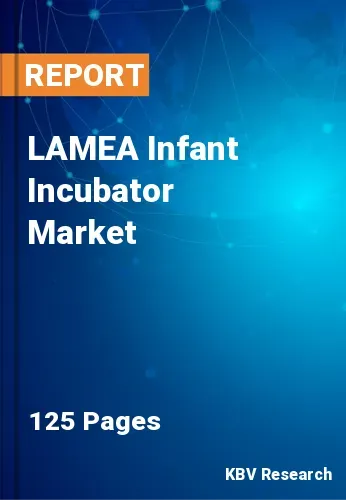The Latin America, Middle East and Africa Infant Incubator Market would witness market growth of 9.0% CAGR during the forecast period (2023-2030). In the year 2026, the LAMEA market's volume is expected to surge to 29.4 thousand units, showcasing a growth of 10.2% (2023-2030).
The substantial factors that drive the growth of the market are an increase in the birth rate of premature infants due to the age of the mother (more than 35 years) and lifestyle habits such as a rise in alcohol consumption, smoking, and drug abuse. It, often called neonatal incubators, are technical medical devices designed to provide a controlled and protective environment for newborns, especially those born prematurely or with medical complications.
The market has witnessed substantial growth in recent years, propelled by the rising incidence of preterm births and the escalating need for advanced healthcare solutions for neonates. Approximately 13.4 million babies were born early (before 37 full weeks of pregnancy) in 2020, around 1 in 10 of all live births. This alarming statistic highlights the crucial need for infant incubators, as premature infants often require specialized care to survive and thrive.
The UAE has a comprehensive healthcare vision and strategy to provide its residents with high-quality healthcare services. Neonatal care, including the availability of advanced equipment like infant incubators, is an integral part of this strategy. The UAE has seen the establishment of Neonatal Intensive Care Units (NICUs) equipped with advanced medical technologies. These units are crucial in providing specialized care for premature infants and those with health complications, driving the demand for infant incubators. The UAE government actively engages in public-private partnerships to enhance healthcare services. Collaborations with private entities can lead to procuring state-of-the-art medical equipment, including infant incubators, to meet the growing healthcare demands. The above aspects will expand the market growth across the region in the upcoming years.
The Brazil market dominated the LAMEA Infant Incubator Market, by Country in 2022, and would continue to be a dominant market till 2030; thereby, achieving a market value of $15,042.6 Thousands by 2030. The Argentina market is exhibiting a CAGR of 9.6% during (2023 - 2030). Additionally, The UAE market would experience a CAGR of 8.7% during (2023 - 2030).
Based on Product, the market is segmented into Normal Incubator, Transport Incubator, and Hybrid Incubator. Based on Application, the market is segmented into Neonatal hypothermia & low birth weight, Jaundice, and Others. Based on End User, the market is segmented into Neonatal & Pediatric Hospitals, Maternity Hospitals, and Hospitals. Based on countries, the market is segmented into Brazil, Argentina, UAE, Saudi Arabia, South Africa, Nigeria, and Rest of LAMEA.
Free Valuable Insights: The Worldwide Infant Incubator Market is Projected to reach USD 944.9 Million by 2030, at a CAGR of 6.8%
The market research report covers the analysis of key stake holders of the market. Key companies profiled in the report include GE HealthCare Technologies, Inc., Natus Medical Incorporated (Archimed SAS), Atom Medical Corporation, Phoenix Medical Systems Pvt. Ltd., Dragerwerk AG & Co. KGaA, Inspiration Healthcare Group PLC, Medicor Elektronika Zrt., Fanem Ltda., Koninklijke Philips N.V., Médipréma Group.
By Product (Volume, Thousand Units, USD Million, 2019 to 2030)
By Application (Volume, Thousand Units, USD Million, 2019 to 2030)
By End User (Volume, Thousand Units, USD Million, 2019 to 2030)
By Country (Volume, Thousand Units, USD Million, 2019 to 2030)

Our team of dedicated experts can provide you with attractive expansion opportunities for your business.

